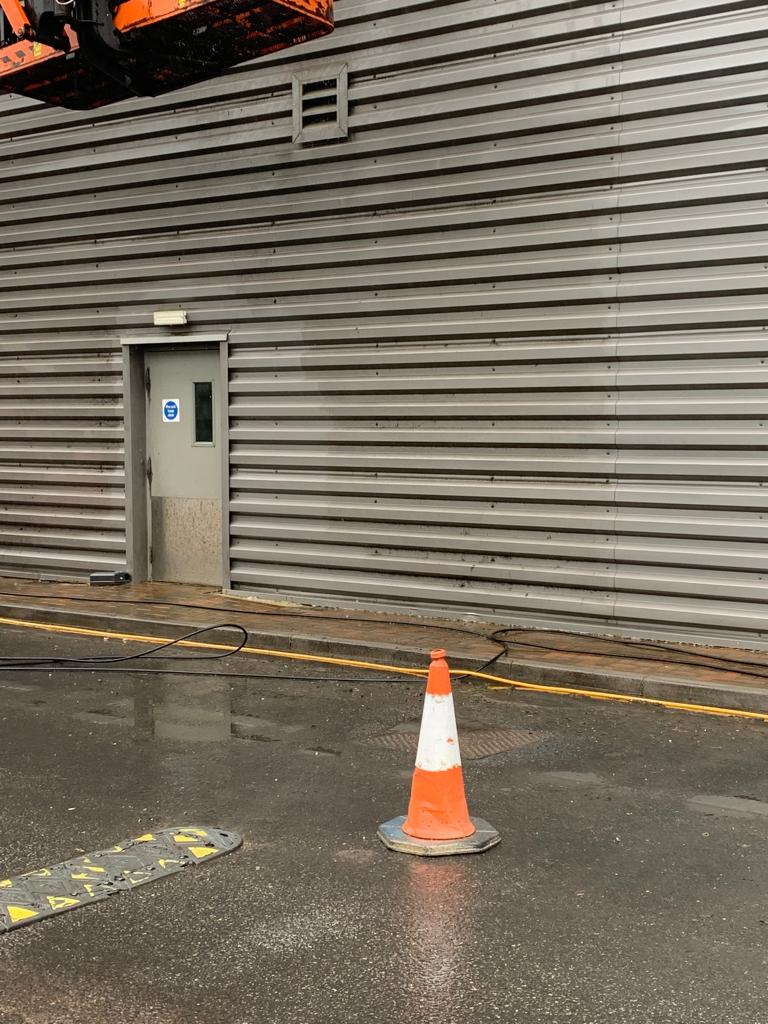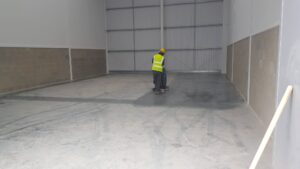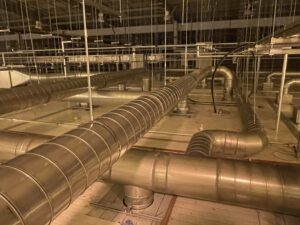Operating at the forefront of the fresh produce preparation industry, we are a large-scale supplier providing pre-cut fruit to leading supermarkets across the UK. Our Northfleet site handles the reception, preparation, and dispatch of tonnes of fresh fruit daily, adhering to stringent food safety and hygiene standards. Given the volume and nature of the work, our operations inevitably produce organic waste, sticky residues, and packaging debris, especially around our external yards where deliveries and waste collections are managed.
Before addressing the issue, the external yard had gradually become a persistent challenge. Despite regular in-house cleaning routines, the build-up of fruit sugars, pulp remnants, and general debris had become too entrenched for our team to manage effectively. The constant arrival and departure of HGVs only worsened the situation, spreading residues further and accelerating surface deterioration. Rainfall, a frequent companion in our Kent location, turned the sugars and organic matter into a slippery film, which not only posed health and safety risks but also presented operational hazards for our vehicle fleet and staff.
We were particularly concerned by the nature of the debris accumulating over time. Sticky residues from fruit juices and pulp—particularly from products like pineapple, melon, and grapes—were attracting pests and creating unpleasant odours. Combined with plastic strapping, pallet wrap, and occasional cardboard offcuts from our packaging lines, the yard had become unsightly and inefficient. Attempts to manage the problem using our in-house resources were falling short, largely due to the scale of the operation and the complexity of the substances involved.
The underlying cause of the problem was multifaceted. Firstly, the constant movement of raw fruit from incoming lorries to preparation lines and waste stations inevitably led to frequent spillages. Secondly, fruit sugars are particularly difficult to clean without industrial-grade equipment. These natural sugars, once exposed to air and moisture, become a sticky, tacky residue that adheres strongly to concrete surfaces. Thirdly, our busy production schedule meant that downtime for thorough deep cleaning was rare, and logistical pressures forced us to prioritise product throughput over infrastructure upkeep. The yard simply became a lower priority—until the consequences began to escalate.
The impact of the problem was soon felt in more ways than one. There were increasing concerns from our health and safety officers about the slip hazard, particularly near the waste compactor and loading bays. One near-miss incident with a forklift operator was a turning point for us, highlighting the real risk to staff safety. Additionally, site audits flagged hygiene concerns that, while not directly affecting product safety, could reflect poorly on our brand if left unaddressed. Suppliers and hauliers began making comments about the state of the yard, and internal morale suffered as well. Nobody wants to work in an environment that looks and smells neglected.
Beyond immediate safety and hygiene issues, the problem was also impacting our operational potential. The sticky build-up was contributing to accelerated wear on our yard vehicles’ tyres and causing clogging in the wheels of trollies and pallets. The presence of fruit waste and organic debris created additional maintenance costs, and we had to increase pest control visits to manage flies and birds attracted to the area. There was even a concern that if the yard conditions worsened further, it could eventually impact our eligibility for certain certifications—something we work very hard to maintain as part of our commitment to high standards in food preparation.
The reality was clear: not solving this problem was costing us far more than we initially realised. The lost opportunity came not only in the form of financial inefficiency, but also in brand perception, employee satisfaction, and potential compliance risks. Moreover, every day we delayed intervention allowed the situation to worsen. We needed a solution that went beyond surface cleaning—a comprehensive intervention that would fully restore the yard and allow us to maintain it to the standards we hold elsewhere across our business.
After assessing various providers, we engaged ACC Commercial Cleaning Ltd, a specialist cleaning contractor with strong experience in industrial and food-sector environments. The promise was straightforward yet ambitious: to conduct a deep clean of the entire yard area, removing built-up sugars, organic residue, and general waste debris using powerful pressure washing equipment and biodegradable, food-safe cleaning agents. The team from ACC Commercial Cleaning Ltd also committed to degreasing high-traffic zones and paying special attention to corners and drainage points where residue had collected.
The clean-up took place over a carefully planned schedule to minimise disruption. ACC Commercial Cleaning Ltd worked during quieter production windows and collaborated closely with our facilities team to ensure safety protocols were met. The transformation was immediate. Thick layers of blackened sugar deposits that had become almost baked into the concrete were stripped away. Drainage grates were cleared of fruit pulp build-up. Even hard-to-reach areas around skips and compactors were thoroughly cleansed.
The results exceeded expectations. The yard was restored to a condition many of our staff said they hadn’t seen since the site first opened. Slippery surfaces were eliminated, odours dissipated, and the area took on a professional, hygienic appearance that reflected our internal standards. Following the clean-up, our facilities team was able to implement a more manageable maintenance routine to preserve the improvements. The intervention gave us a clean slate, both literally and operationally.
The intervention also had an unexpected ripple effect across the site. Staff took greater pride in the work environment. External partners commented positively on the improved appearance. Most importantly, we significantly reduced the risk of slips, pest infestations, and vehicle wear. Since the clean, there has been a measurable decrease in health and safety observations related to the yard. The investment in ACC Commercial Cleaning Ltd more than paid for itself when considered against the costs we were incurring through delay, inefficiency, and reputational risk.
Looking back, this was a problem that crept in gradually but carried heavy consequences. The intervention led by ACC Commercial Cleaning Ltd showed us the value of stepping back and addressing operational blind spots with fresh eyes and professional expertise. Going forward, we’ve now incorporated scheduled external deep cleans into our annual site plan, ensuring this doesn’t become a reactive issue again.
This experience has reinforced a simple truth: cleanliness is not just about presentation—it’s a foundational part of how we protect our people, our brand, and our business. Thanks to ACC Commercial Cleaning Ltd, our Northfleet site is not only back on track but ahead of where it was before.



